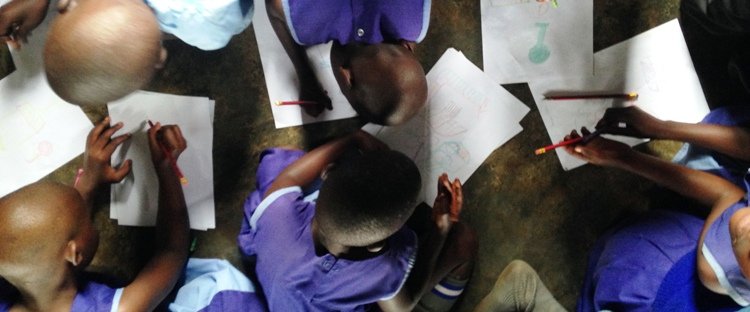You know what’s the biggest fear people have about volunteering and travel in East Africa? Health and safety. Which is hilarious as this place is safer than most American and European cities. Petty crime and theft are low. War and pestilence is the subject of novels. We even weathered the COVID-19 pandemic relatively well.
Don’t just take my word for it, read what some of our former volunteers have to say.
Since most of The Real Uganda’s volunteers live in a village setting, with local hosts, they are given a respect and support they wouldn’t be afforded as regular tourists. Further, Ugandan local food is fresh, whole, and cooked by people who feed their families everyday. There are over 47 million people living in Uganda – and while some do indeed pass away each year, our population continues to grow and thrive annually.
I blame negative marketing. Ugandans need to have their stories heard, rather than short term visitors and aid agencies telling them. What makes me qualified to comment? I’ve lived full time in Uganda since 2004. I gave birth in Kampala and am raising my son here. I became a Ugandan citizen in 2017.
The Real Uganda offers 2 – 12 week locally-led communty-based volunteer programs.

One of the main objectives of The Real Uganda is to share the successes and challenges of life in Uganda. There are a lot of positives out here. Today, I present 9 (totally obvious, yet for some reason, largely unknown) ways to easily stay safe and healthy while volunteering and traveling in Uganda.
1. Eat the local food
Ugandans know how to prepare their food. It’s cut or killed fresh, then steamed, smoked, or boiled for hours. It’s a preservative free diet. We buy food (or take it fresh out of the ground), cook it, and eat it. We don’t stockpile. We don’t require refrigeration. Just make sure it’s served hot.
And get ready to enjoy!
2. eat the roadside food
Again, Ugandans are doing the preparation and consumption. All food is brought to the market fresh. It is cooked and sold quickly. If you see a roadside kiosk with many cars and trucks full of travelers buying snacks, get in line. It’s all delicious.
I HIGHLY recommend the gonja – roasted sweet bananas. You’ll also find amazing roasted chicken and beef, and cold water and sodas.

3. stay hydrated
It’s hot here and you move quickly. You’ll be sweaty. Ugandans tend to move relatively slower and don’t hang around in the sun trying to get a tan. Since your body is used to a (more western) diet high in sodium and sugar, you’ll find supplementing helpful. Bring some electrolytes (oral rehydration salts) to add to your drinking water, and enjoy an occasional soda. Try to drink 2 litres of water each day.
Or hydrate the Ugandan way – chew sugarcane and jackfruit!
RELATED: Traveling to Uganda? Here’s our East Africa essentials packing guide!
4. Take Anti-malarials, Sleep Under a Mosquito Net & Wear your mask
Yes, I know it’s hot. Suck it up. If you take your meds and use your net properly, you won’t get malaria. However, if you don’t take your meds or use your net properly, and you DO get malaria – no problem. Uganda is the place to be when suffering from malaria. Diagnosis is quick and easy. The cure is cheap and widely available. We have an array of international clinics that can help you out.
Malaria only kills you if you don’t treat it. At the first sign of fever, go for testing at any Lancet lab or International Medical Centre. They have branches in Kampala, Mukono, and Jinja.
While you may be vaccinated for COVID-19, note that most of the community members you’ll be working with are not. Keep them safe by wearing your mask properly.
RELATED: Search flights to Uganda
5. no ear buds when wandering about
As a pedestrian in Uganda, you do not have the right of way. You need to be alert to what’s going on around you. And – yes – it’s incredibly hectic! Trucks, taxis, cars, bodabodas, and bicycles will hoot at you as they come up from behind. That is your cue to step aside.
If you can’t hear them, you’ll get knocked. It’ll be your fault. It’s not the norm for them to go around you.
6. When You See Ugandans Running, Don’t Ask Questions – Run
From time to time, Uganda experiences civil unrest. Since we’re not actually permitted to peacefully protest, teargas happens. Luckily, Ugandans only run in huge groups when they have to. Trust them and go with the flow. These events are normally very small scale and localized. Just remove yourself from the environment. This is not your fight.
If you do get tear-gassed, pour some water (which you’ll be carrying, since you’re staying hydrated!) on a hanky or the bottom of your t-shirt/dress and flush out your eyes. It’s uncomfortable, but you’ll be fine.
This is what it’s like when a government doesn’t necessarily represent it’s people.
RELATED: World Nomads travel insurance has been designed by travelers for travelers, with coverage for more than 150 activities as well as emergency medical, lost luggage, trip cancellation and more.
The Real Uganda's online shop has uniquely Ugandan tees, caps, bags, and mugs. Look great and support our community programs.

7. be respectful
You’ll find treating everyone you meet in a friendly manner and dressing modestly will earn you respect and protection. Greet everyone you meet with a simple “How are you?” or “Jebale ko”. No one wants to mug the sweet mzungu living in the village. However, if you are too quiet, closed off, or seem to be judgmental – watch out.
Ugandans are too busy to worry about someone who isn’t engaged and doesn’t respect local customs.
8. be street smart
Uganda is like any other country. Don’t carry your expensive phone in your hand. Don’t wear your camera around your neck. Know that some of the super friendly people approaching you aren’t 100% trustworthy. Use your head and don’t ignore red flags.
Having said that, totally meet and greet strangers, and share a cup of tea. You won’t connect with a more welcoming, open, and interested bunch of people anywhere else!
Some of your best travel memories will come from swapping stories with new friends.
9. Ignore all Advice from Those Who Have Not Been to Uganda
Your less traveled friends and family are normally the most outspoken and well-meaning, yes. But they’re poorly informed and perhaps jealous of your travels. Just nod and smile, and refer them to this blog!
Know you’re about to embark on the most exciting (and generally safe and healthy) experience of your life.
Not convinced? Check out these independently published interviews with former volunteers!

There’s hula hoops – it can’t possibly be scary
Want to put the above to the test? Time to plan your trip! Once committed, all our travelers receive a multi-page orientation document with details of how to live, work, and stay safe and healthy in Uganda.
Should any civil unrest occur during your stay, know that it happens largely in Kampala, hours away from where we operate. We’ll let you know about it, but also advise you to relax and enjoy your day.
And be happy you’re supporting a country full of people who know their rights and aren’t afraid to fight for them.











Very interesting article, and helpful of course! I think that the last advice ”IGNORE ALL ADVICE GIVEN BY THOSE WHO HAVE NEVER BEEN TO UGANDA” must be followed for everywhere every time.
I agree! It’s amazing how everyone has an opinion about travel whether they do it or not. Thanks for taking the time to comment.
All great ideas. I’ve traveled to uganda many times and never gotten sick. Wonderful country and very friendly people.
Great information…It really helped on my Uganda trip
My heart is in Uganda (NewHope Uganda – near Kiwoko). When folks express alarm about safety – my quick response is, “I was scared to death in Miami International, not to mention the traffic on I-95! Do you know my statistical chances of staying alive for three hours on the interstate were?” (Florida had lost 3,000 deaths on the interstate in 2016)